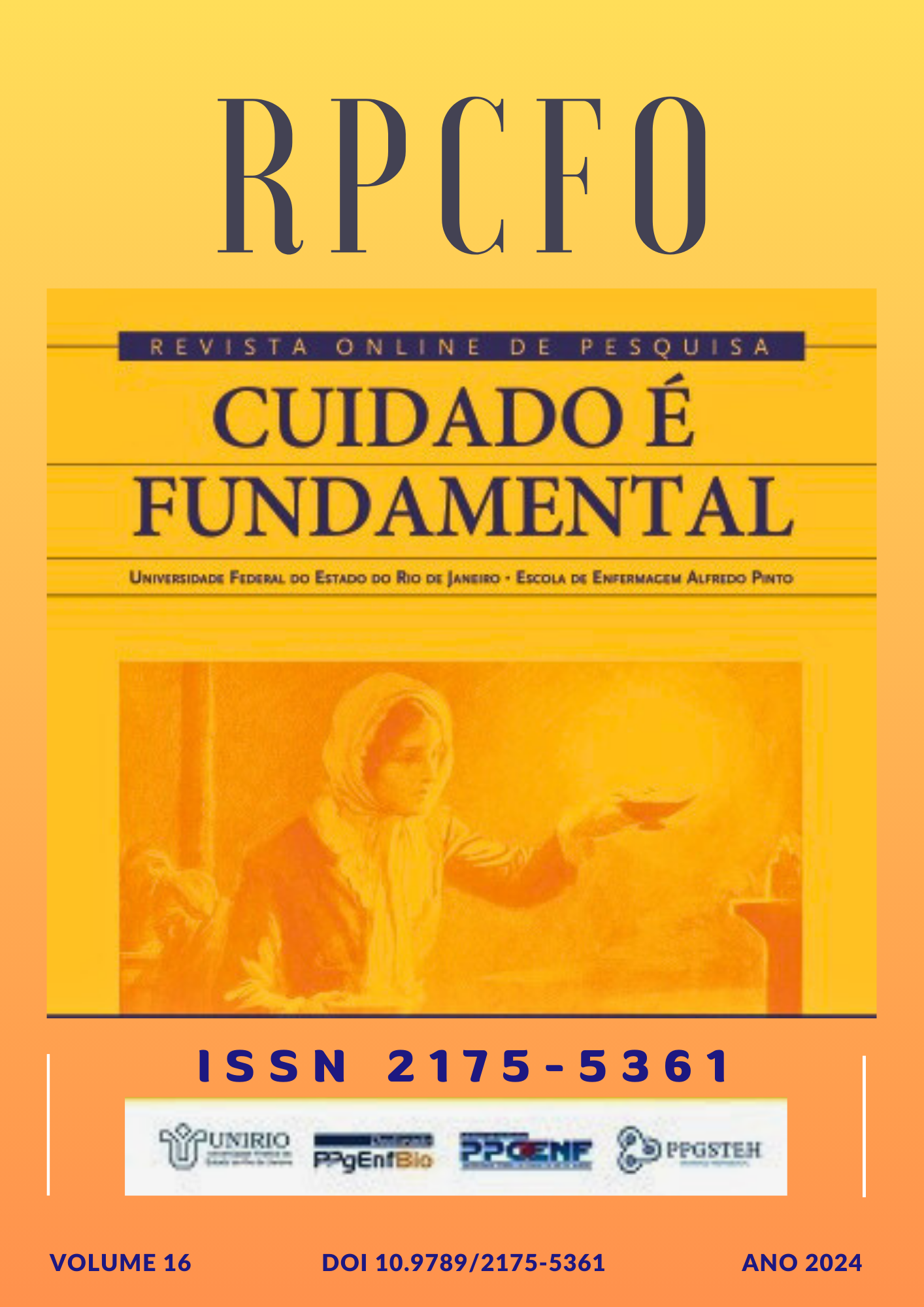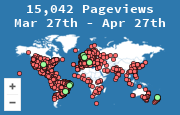Incidence and factors associated with postpartum depressive symptoms: a literature review / Incidência e fatores associados aos sintomas depressivos pós-parto: uma revisão de literatura
DOI:
https://doi.org/10.9789/2175-5361.rpcfo.v16.13014Palavras-chave:
Depressão pós-parto, Período pós-parto, Saúde da mulherResumo
Objetivo: identificar na literatura científica as incidências dos sintomas depressivos pós-parto e os fatores associados. Método: revisão narrativa da literatura descrita conforme a declaração Preferred Reporting Items for Systematic Reviews and Meta-Analyses. A busca bibliográfica foi realizada na Biblioteca Virtual em Saúde. Foram elegíveis estudos observacionais com delineamento longitudinal, que utilizaram a Escala de depressão pós-parto de Edimburgo, disponíveis em texto completo, publicados nos anos de 2019 e 2020. Resultados: foram incluídos 17 artigos. A incidência de sintomatologia depressiva pós-parto variou de 0,18% a 27,87%. Os principais fatores de risco associados foram histórico de depressão, estresse e relação estressante familiar, baixo suporte social, transtornos psiquiátricos como comorbidade e experiência negativa ou complicações durante parto. Conclusões: a sintomatologia depressiva pós-parto atinge parcela expressiva das puérperas e se mantém como problema de saúde pública. Sugere-se a continuidade dos estudos que se relacionam com a temática no cenário nacional.
Downloads
Referências
Christenson A, Johansson E, Reynisdottir S, Torgerson J, Hemmingsson E. Women’s Perceived Reasons for Their Excessive Postpartum Weight Retention: A Qualitative Interview Study. PLoS One [Internet]. 2016 [cited 2021 aug 3];11(12). Available from: https://doi.org/10.1371/journal.pone.0167731
Huang L-H, Lee T-H, Huang J-Y, Ng S-C, Lee M-S, Lee S-H. Effect of stay in a postpartum care institution on postpartum depression in women. Midwifery [Internet]. 2020 [cited 2021 aug 3];82. Available from: https://www.sciencedirect.com/science/article/pii/S0266613819302918
Wan Mohamed Radzi CWJB, Salarzadeh Jenatabadi H, Samsudin N. Postpartum depression symptoms in survey-based research: a structural equation analysis. BMC Public Health [Internet]. 2021 [cited 2021 aug 3];21(1). Available from: https://doi.org/10.1186/s12889-020-09999-2
Wang Z, Liu J, Shuai H, Cai Z, Fu X, Liu Y, et al. Correction: Mapping global prevalence of depression among postpartum women. Transl Psychiatry [Internet]. 2021 [cited 2021 aug 3];11(1). Available from: https://doi.org/10.1038/s41398-021-01692-1
Putnick DL, Sundaram R, Bell EM, Ghassabian A, Goldstein RB, Robinson SL, et al. Trajectories of Maternal Postpartum Depressive Symptoms. Pediatrics. United States; 2020 [cited 2021 aug 3];146(5). Available from: https://doi.org/10.1542/peds.2020-085
Lobato G, Moraes CL, Reichenheim ME. Magnitude da depressão pós-parto no Brasil: uma revisão sistemática. Rev Bras Saude Mater Infant [Internet]. 2011 [acesso em 3 de agosto de 2021];11(4). Disponível em: https://doi.org/10.1590/S1519-38292011000400003
Dekel S, Ein-Dor T, Ruohomäki A, Lampi J, Voutilainen S, Tuomainen T-P, et al. The dynamic course of peripartum depression across pregnancy and childbirth. J Psychiatr Res [Internet]. 2019 [cited 2021 aug 3];113. Available from: https://www.sciencedirect.com/science/article/pii/S0022395618303480
Chen H-H, Chien L-Y. A comparative study of domestic decision-making power and social support as predictors of postpartum depressive and physical symptoms between immigrant and native-born women. PLoS One [Internet]. Public Library of Science; 2020 [cited 2021 aug 3];15(4). Available from: https://doi.org/10.1371/journal.pone.0231340
First MB, Gaebel W, Maj M, Stein DJ, Kogan CS, Saunders JB, et al. An organization- and category-level comparison of diagnostic requirements for mental disorders in ICD-11 and DSM-5. World Psychiatry [Internet]. John Wiley & Sons, Ltd; 2021 [cited 2021 aug 4];20(1). Available from: https://doi.org/10.1002/wps.20825
American Psychiatry Association. DSM-V-TR - Manual Diagnóstico e Estatístico de Transtornos Mentais. Porto Alegre: Artmed, 2013.
Lubotzky-Gete S, Ornoy A, Grotto I, Calderon-Margalit R. Postpartum depression and infant development up to 24 months: A nationwide population-based study. J Affect Disord [Internet]. 2021 [cited 2021 aug 4];285. Available from: https://www.sciencedirect.com/science/article/pii/S0165032721001683
Park M, Brain U, Grunau RE, Diamond A, Oberlander TF. Maternal depression trajectories from pregnancy to 3 years postpartum are associated with children’s behavior and executive functions at 3 and 6 years. Arch Womens Ment Health [Internet]. 2018 [cited 2021 aug 4];21(3). Available from: https://doi.org/10.1007/s00737-017-0803-0
Park M, Brain U, Grunau RE, Diamond A, Oberlander TF. Maternal depression trajectories from pregnancy to 3 years postpartum are associated with children’s behavior and executive functions at 3 and 6 years. Arch Womens Ment Health [Internet]. 2018 [cited 2021 aug 4];21(3). Available from: https://doi.org/10.1007/s00737-017-0803-0
Moher D, Liberati A, Tetzlaff J, Altman DG, Group TP. Preferred Reporting Items for Systematic Reviews and Meta-Analyses: The PRISMA Statement. PLOS Med [Internet]. Public Library of Science; 2009 [cited 2021 aug 4];6(7). Available from: https://doi.org/10.1371/journal.pmed.1000097
Downs SH, Black N. The feasibility of creating a checklist for the assessment of the methodological quality both of randomised and non-randomised studies of health care interventions. J Epidemiol Community Health [Internet]. 1998 [cited 2021 aug 4];52(6). Available from: http://jech.bmj.com/content/52/6/377.abstract
Leonard KS, Evans MB, Kjerulff KH, Symons Downs D. Postpartum Perceived Stress Explains the Association between Perceived Social Support and Depressive Symptoms. Women’s Heal Issues [Internet]. Elsevier; 2020 [cited 2021 aug 4];30(4). Available from: https://doi.org/10.1016/j.whi.2020.05.001
Yu M, Gong W, Taylor B, Cai Y, Roman Xu D. Coping styles in pregnancy, their demographic and psychological influences, and their association with postpartum depression: A longitudinal study of women in China. Int J Environ Res Public Health. 2020 [cited 2021 aug 15];17(10). Available from: https://doi.org/10.3390%2Fijerph17103654
Solomonova E, MacKinnon AL, Gold I, Robins S, Wunderlich S, Feeley N, et al. Disordered sleep is related to delusional ideation and depression during the perinatal period. Sleep Heal [Internet]. 2020 [cited 2021 aug 15];6(2). Available from: https://www.sciencedirect.com/science/article/pii/S2352721820300036
Pataky EA, Ehlert U. Longitudinal assessment of symptoms of postpartum mood disorder in women with and without a history of depression. Arch Womens Ment Health [Internet]. 2020 [cited 2021 aug 16];23(3). Available from: https://doi.org/10.1007/s00737-019-00990-4
Gross GM, Kroll-Desrosiers A, Mattocks K. A Longitudinal Investigation of Military Sexual Trauma and Perinatal Depression. J Women’s Heal [Internet]. Mary Ann Liebert, Inc., publishers; 2019 [cited 2021 aug 16];29(1). Available from: https://doi.org/10.1089/jwh.2018.7628
Liu Z-H, He S-T, Deng C-M, Ding T, Xu M-J, Wang L, et al. Neuraxial labour analgesia is associated with a reduced risk of maternal depression at 2 years after childbirth: A multicentre, prospective, longitudinal study. Eur J Anaesthesiol | EJA [Internet]. 2019 [cited 2021 aug 16];36(10). Available from: https://journals.lww.com/ejanaesthesiology/fulltext/2019/10000/neuraxial_labour_analgesia_is_associated_with_a.5.aspx
Aris-Meijer J, Bockting C, Stolk R, Verbeek T, Beijers C, van Pampus M, et al. What if pregnancy is not seventh heaven? The influence of specific life events during pregnancy and delivery on the transition of antenatal into postpartum anxiety and depression. Int J Environ Res Public Health. 2019 [cited 2021 aug 16];16(16). Available from: https://doi.org/10.3390/ijerph16162851
Lin P-Y, Chiu T-H, Ho M, Pei-Chen Chang J, Hui-Chih Chang C, Su K-P. Major depressive episodes during pregnancy and after childbirth: A prospective longitudinal study in Taiwan. J Formos Med Assoc [Internet]. 2019 [cited 2021 aug 16];118(11). Available from: https://www.sciencedirect.com/science/article/pii/S0929664617306290
Navodani T, Gartland D, Brown SJ, Riggs E, Yelland J. Common maternal health problems among Australian-born and migrant women: A prospective cohort study. PLoS One [Internet]. 2019 [cited 2021 aug 16];14(2). Available from: https://doi.org/10.1371/journal.pone.0211685
Skalkidou A, Poromaa IS, Iliadis SI, Huizink AC, Hellgren C, Freyhult E, et al. Stress-related genetic polymorphisms in association with peripartum depression symptoms and stress hormones: A longitudinal population-based study. Psychoneuroendocrinology [Internet]. 2019 [cited 2021 aug 16];103. Available from: https://www.sciencedirect.com/science/article/pii/S0306453018310369
Mak JKL, Lee AH, Pham NM, Tang L, Pan X-F, Binns CW, et al. Gestational diabetes and postnatal depressive symptoms: A prospective cohort study in Western China. Women and Birth [Internet]. 2019 [cited 2021 aug 16];32(3). Available from: https://www.sciencedirect.com/science/article/pii/S1871519218302269
Takács L, Seidlerová JM, Štěrbová Z, Čepický P, Havlíček J. The effects of intrapartum synthetic oxytocin on maternal postpartum mood: findings from a prospective observational study. Arch Womens Ment Health [Internet]. 2019 [cited 2021 aug 19];22(4). Available from: https://doi.org/10.1007/s00737-018-0913-3
Riquin E, Lamas C, Nicolas I, Dugre Lebigre C, Curt F, Cohen H, et al. A key for perinatal depression early diagnosis: The body dissatisfaction. J Affect Disord [Internet]. 2019 [cited 2021 aug 19];245. Available from: https://www.sciencedirect.com/science/article/pii/S0165032718316598
Song C, Li W, Leng J, Wang L, Li W, Shi F, et al. Passive smoking and postpartum depression among Chinese women: A prospective cohort study in Tianjin, China. Women Health [Internet]. 2019 [cited 2021 aug 19];59(3). Available from: https://doi.org/10.1080/03630242.2018.1478365
Cox JL, Murray D, Chapman G. A Controlled Study of the Onset, Duration and Prevalence of Postnatal Depression. Br J Psychiatry [Internet]. 1993 [cited 2021 aug 19];163(1). Available from: https://www.cambridge.org/core/article/controlled-study-of-the-onset-duration-and-prevalence-of-postnatal-depression/6E8782D6F4FD2A0630D0F53411DD1A02
Yang YH, Huang X, Sun MY, Yang L, Zheng RM. [Analysis on depression state outcomes and influencing factors of persistent depression in pregnant and perinatal women in China]. Zhonghua Liu Xing Bing Xue Za Zhi. 2022 [cited 2021 aug 19];43(1).
Arrais A da R, Araujo TCCF de. Pré-Natal Psicológico: perspectivas para atuação do psicólogo em saúde materna no Brasil. Rev da SBPH [Internet]. 2016 [cited 2021 aug 19];19. Available from: http://pepsic.bvsalud.org/scielo.php?script=sci_arttext&pid=S1516-08582016000100007&nrm=iso
O’Hara MW, McCabe JE. Postpartum Depression: Current Status and Future Directions. Annu Rev Clin Psychol [Internet]. 2013 [cited 2021 aug 21];9(1). Available from: https://doi.org/10.1146/annurev-clinpsy-050212-185612
Wake GE, Fitie GW, Ashenafi B, Tadese M, Tessema SD. Magnitude and Determinant Factors of Postpartum Depression Among Mothers Attending Their Postnatal and Vaccination Services at Public Health Institutions of Addis Ababa, Ethiopia. Front Public Heal [Internet]. 2022 [cited 2021 aug 21];10. Available from: https://www.frontiersin.org/articles/10.3389/fpubh.2022.882205
Ramos A, Martins AC, Pessoa D, Machado MC, Noronha FM. FATORES ASSOCIADOS À DEPRESSÃO PÓS-PARTO: Revisão Integrativa. EnciBio [Internet]. 2018 [acesso em 22 de agosto de 2021];15(27). Disponível em: https://conhecer.org.br/ojs/index.php/biosfera/article/view/618
Moll MF, Matos A, Rodrigues TA, Martins TS, Pires FC, Pires NAS. Rastreando a depressão pós-parto em mulheres jovens. Rev. Enferm. UFPE on Line [Internet]. 2019 [acesso em 22 de agosto de 2021];13(5). Disponível em: https://doi.org/10.5205/1981-8963-v13i5a239181p1338-1344-2019
Ahmed GK, Elbeh K, Shams RM, Malek MAA, Ibrahim AK. Prevalence and predictors of postpartum depression in Upper Egypt: A multicenter primary health care study. J Affect Disord [Internet]. 2021 [cited 2021 aug 22];290. Available from: https://www.sciencedirect.com/science/article/pii/S0165032721003785
Jeong YJ, Nho JH, Kim HY, Kim JY. Factors influencing quality of life in early postpartum women. Int J Environ Res Public Health. 2021 [cited 2021 aug 22];18(6). Available from: https://doi.org/10.3390%2Fijerph18062988
Dibaba Y, Fantahun M, Hindin MJ. The association of unwanted pregnancy and social support with depressive symptoms in pregnancy: evidence from rural Southwestern Ethiopia. BMC Pregnancy Childbirth [Internet]. 2013 [cited 2021 aug 22];13(1). Available from: https://doi.org/10.1186/1471-2393-13-135
Seymour‐Smith M, Cruwys T, Haslam SA. More to lose? Longitudinal evidence that women whose social support declines following childbirth are at increased risk of depression. Aust N Z J Public Health [Internet]. 2021 [cited 2021 aug 24];45(4). Available from: https://www.sciencedirect.com/science/article/pii/S132602002300420X
Airosa S, Silva I. Associação Entre Vinculação, Ansiedade, Depressão, Stresse E Suporte Social Na Maternidade. Psicologia, Saúde e Doenças [Internet]. 2013 [acesso em 24 de agosto de 2021];14(1). Disponível em: https://www.redalyc.org/pdf/362/36226540008.pdf
Araújo N, Cerqueira-Santos E. Depressão, ansiedade e suporte social na gestação: um estudo exploratório pré-intervenção. Saúde e Desenvolvimento Humano [Internet] 2021 [acesso em 25 de agosto de 2021];9(3). Disponível em: https://doi.org/10.18316/sdh.v9i3.7739
Mughal S, Azhar Y, Siddiqui W. Postpartum Depression (Nursing). In StatPearls [Internet] Treasure Island (FL): StatPearls Publishing, 2022 [cited 2022 nov 12]. Available from: https://www.ncbi.nlm.nih.gov/books/NBK519070/
Almeida LWS de, Nascimento CIS do, Santos LA, Souza LR de, Barreto MNL, Oliveira YN de, et al. Good practices in the delivery room and anxiety in postpartum women: what can it influence? Res Soc Dev [Internet]. 2021 [cited 2021 sep 12];10(11). Available from: https://rsdjournal.org/index.php/rsd/article/view/19778
Publicado
Como Citar
Edição
Seção
Licença
Copyright (c) 2024 Revista de Pesquisa Cuidado é Fundamental Online

Este trabalho está licenciado sob uma licença Creative Commons Attribution-NonCommercial-ShareAlike 4.0 International License.
TERMO DE TRANSFERÊNCIA DE DIREITOS AUTORAIS
Transfiro os direitos autorais deste artigo para a Revista de Pesquisa Cuidado é Fundamental - Online - RPCF, assim que ele for aceito para a devida publicação eletrônica. Os direitos de autor incluem o direito de reproduzir na íntegra ou em parte por qualquer meio, distribuir o referido artigo, incluindo figuras, fotografias, bem como as eventuais traduções. O autor pode ainda, imprimir e distribuir cópias do seu artigo, desde que mencione que os direitos pertencem a RPCF. Declaro que este manuscrito é original, não tendo sido submetido à publicação, na íntegra ou em partes para outros periódicos online ou não, assim cmmo em Anais de eventos científicos ou capítulos de livros.






























